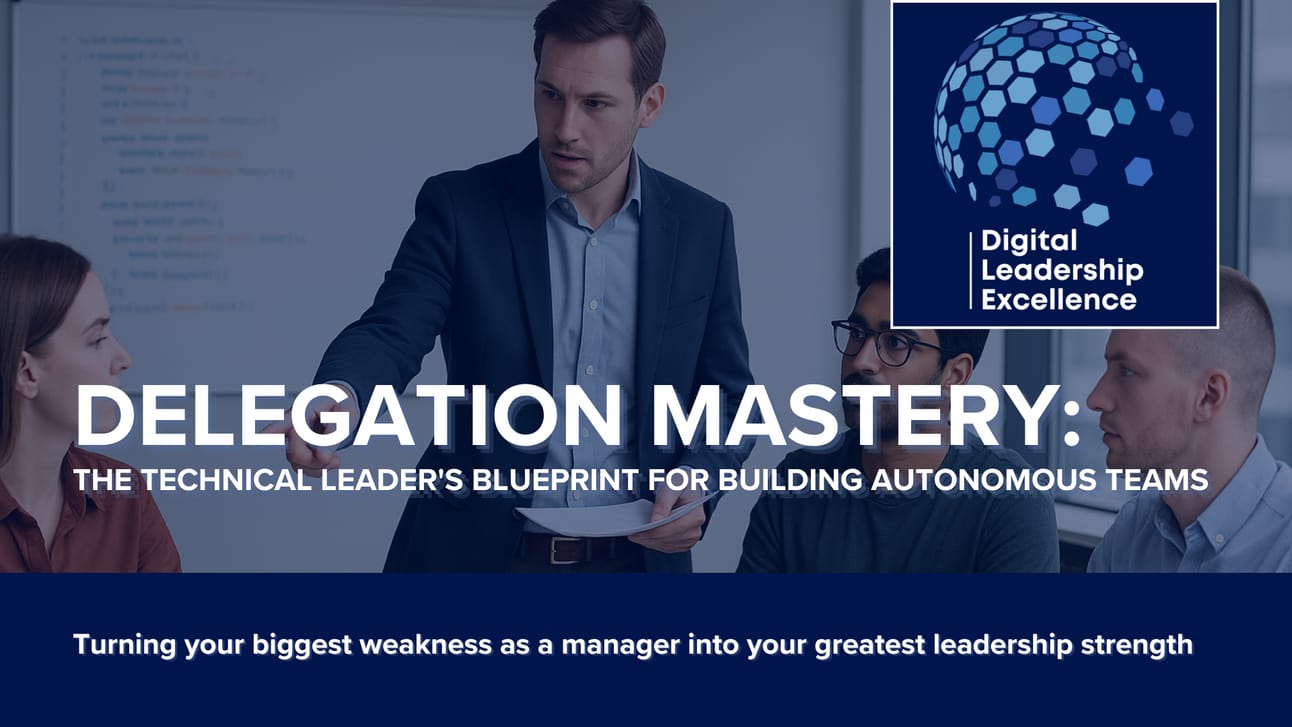Greetings, and welcome to Digital Leadership Excellence—your trusted weekly guide to excelling in tech leadership, delivering results, and thriving with clarity and purpose. In every issue, we provide insights into winning strategies, growth tactics, and practical solutions, designed to support both current and aspiring technology leaders navigating the ever-evolving digital world.
1.0 Your Biggest Weakness is About to Become Your Greatest Strength
Here's a question that haunts every newly promoted technical leader:
"How do I get results through people when I can do it faster myself?"
Meet Alex, a senior software engineer who just became Engineering Manager. Brilliant mind. Could architect solutions that made seasoned CTOs jealous.
But three months into leadership? His team was falling apart.
The wake-up call came during his performance review:
"Alex, your team's velocity has dropped. Two developers have requested transfers. What's going on?"
Alex's honest answer? "I don't understand why everything takes them so long. I keep having to redo their work to meet our standards."
Sound familiar?

Alex had fallen into what I call The Delegation Trap. Believing that doing it yourself is faster than teaching others to do it right.
Here's the brutal math:
Alex could solve a complex API integration in 2 hours
Teaching a developer took 6 hours initially
So Alex kept solving them himself
Result? His team never learned. He became the permanent bottleneck.
2.0 The Hidden Cost of "Faster"
While Alex was optimizing for speed, he was destroying something far more valuable: team capability.
Every time he said "I'll just handle this," he was:
Robbing his team of growth opportunities
Creating learned helplessness
Building a single point of failure (himself)
Guaranteeing he'd work weekends forever

But here's what changed everything...
During a particularly brutal 80-hour week, Alex had an epiphany:
"I'm not protecting quality. I'm preventing my team from developing the judgment to maintain quality themselves."
That's when he discovered Delegation Mastery - the strategic framework that transforms your biggest leadership weakness into your greatest strength.
3.0 The Three Pillars of Delegation Mastery
Pillar 1: Strategic Trust Building
Instead of hoping your team will figure it out, you systematically build their decision-making capabilities.
Pillar 2: Graduated Autonomy
You don't go from micromanagement to complete hands-off overnight. You create a progression path.
Pillar 3: Quality Through Systems
You maintain standards not through control, but through clarity and consistent feedback loops.

Alex's Transformation
Using this framework, Alex made a radical shift:
Instead of asking: "How do I make sure this is done right?" He started asking: "How do I build someone who can ensure this is done right?"
The results were staggering:
Within 12 weeks:
Team velocity increased
Code quality scores improved
Zero weekend work for Alex
His team started solving problems he couldn't have solved
But the real breakthrough?
His team began innovating beyond his own capabilities. They brought perspectives he'd never considered. Solutions he couldn't have designed.
Alex went from being the smartest person in the room to building a room full of smart people.
That's Delegation Mastery.
4.0 The Delegation Mastery Blueprint
Ready to transform your biggest weakness into your greatest strength?
Here's the exact framework Alex used to build an autonomous team:
The Strategic Delegation Framework
Level 1: Guided Execution
"Here's exactly what to do and how to do it. Let me walk you through it."
Use for: Critical systems, new team members, high-risk scenarios
Duration: 1-2 iterations
Goal: Establish baseline competency
Level 2: Supported Decision-Making
"Here's the outcome we need. Here are the constraints. Show me your approach first."
Use for: Intermediate challenges, developing team members
Duration: 3-5 iterations
Goal: Build judgment while maintaining safety
Level 3: Autonomous Execution
"Here's the goal and success criteria. Use your best judgment. Keep me informed."
Use for: Experienced team members, proven areas
Duration: Ongoing with periodic check-ins
Goal: Full ownership with strategic alignment
Level 4: Strategic Partnership
"This is your domain. You set the direction. Brief me on major decisions."
Use for: Subject matter experts, strategic initiatives
Duration: Permanent delegation
Goal: Team member becomes the expert
5.0 The Delegation Conversation Template
When Alex started delegating, he used this exact script:
"Sarah, I'm moving our API security reviews to Level 2 delegation. Here's what that means:
You'll design the approach and implementation plan. Before you start coding, we'll do a 15-minute review of your strategy.
Success criteria: Zero security vulnerabilities, performance under 200ms, clean documentation.
If you hit any blockers or need guidance, escalate immediately. No points lost for asking questions.
After this project, we'll evaluate moving you to Level 3 for future security work.
Questions?"
Clear expectations. Clear safety net. Clear progression path.
The Weekly Mastery Calibration
Every Friday, Alex held 10-minute calibration sessions:
"What decisions did you make this week that you're proud of?"
"What would you handle differently next time?"
"Where are you ready for more autonomy?"
"What support do you need from me?"
These conversations built trust incrementally and identified readiness for advancement.
The Quality Paradox
Here's what shocked Alex most:
When he stopped controlling every decision, quality actually improved.
Why? Because his team started thinking like owners instead of order-takers.
They began:
Anticipating edge cases he missed
Asking better questions during planning
Taking personal pride in their solutions
Peer-reviewing more thoroughly

Sarah's Breakthrough Story
Sarah was a mid-level developer who Alex never trusted with architecture decisions.
Using the Delegation Mastery framework:
Week 1: Level 2 delegation on a small API refactor
Week 3: She identified a security flaw Alex missed
Week 6: Level 3 autonomy on all API work
Week 10: She designed a caching solution that improved performance 300%
Six months later? Sarah was promoted to Senior Engineer and became Alex's go-to person for complex system design.
The Multiplication Effect
The magic of Delegation Mastery isn't just individual growth - it's team multiplication.
Alex's team went from being dependent on him to being a self-improving system:
They mentored each other
They created their own quality standards
They proactively identified and solved problems
They freed Alex to focus on strategic initiatives
6.0 Your Delegation Mastery Action Plan
This Week:
Audit your current workload - What are you doing that others could learn?
Pick ONE team member for your first delegation experiment
Choose ONE task to move from Level 1 to Level 2
Next Week:
Have the delegation conversation using the template above
Schedule your first weekly calibration session
Within 30 Days:
Track the results - their growth AND your time savings
Expand to your next team member
The Ultimate Truth
Your team is more capable than you think. They're just waiting for permission to prove it.
Delegation Mastery isn't about losing control - it's about multiplying your impact through others.
The question isn't whether you can afford to delegate. It's whether you can afford NOT to.
What's the first decision you're going to delegate this week?



